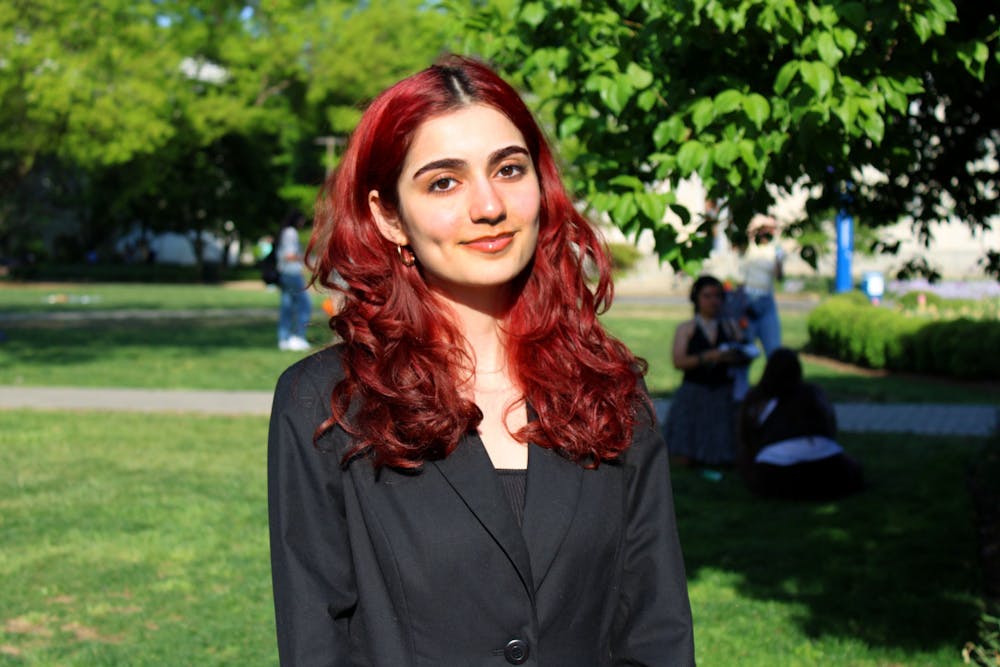The following piece is an opinion and does not reflect the views of The Eagle and its staff. All opinions are edited for grammar, style and argument structure and fact-checked, but the opinions are the writer’s own.
What is left when one’s body is held captive, their words ravaged?
Words are powerful. There’s solitude a pencil and a piece of paper can provide. They can fill up an empty page with various silhouettes and colors. They personify words and bring them to life.
But not when you have to pick those words carefully, tread on thin lines to protect your entirety. Words turn into bullets that can be thrown at you at any moment. You learn from a young age that anger isn’t pretty — destructive even, a force that should not be in your vocabulary.
So when your words are discarded, they stop existing. Pages left empty. Personhood stripped. A part of you forever stolen away.
University students have often chosen various paths for advocacy, speech being vital to many of them. Some join the student government in hopes of implementing policy change; some create affinity spaces on campus. After all, everyone’s role in the movement is different. But student activism and speech is also rage. Rage that can’t be contempt, rage that is revolutionary. Nevertheless, rage is not a well-liked character in the administration’s books. They tell students to repress their anger, to not cross boundaries. To speak silently, to not make sudden body movements that can turn the bullets of words toward you. Hesitancy enters the conversation, and you hear the same response until they can dispose of you. They tell you there’s only one way to respond while patting themselves on the back for supporting student freedom of speech.
There are guidelines, rules even. You are not allowed to be mad; you can’t be reactive. The indoor protest ban came into place because the students were disrupting the flow of classrooms — the same classrooms where they learn to take initiative, the same classrooms that teach them how to survive in the world. We are disruptive if we protest. We are disruptive if we speak. We are disruptive if we look the wrong way.
Let’s break down the dynamic between the administration and the student body: there’s only one head on the body, the one who calls all the decisions. No matter how much the body opposes and fights back, the head makes the call. There is an interdependent relationship in the body, where the figure ceases to move without the head.
The head will not allow it to, because there always comes a time when the oppressor knows to put back on the shackles, leaving the body dismembered. The disfigured body turns into a puppet, unable to move without directions.
And that’s when I think of rage, debilitating rage that the shackles can’t reach. A rage that won’t respond to the baton. A rage that is a friend; a rage that will hear you; a rage that cannot be tamed. This is the same eloquent rage Brittney Cooper talks about. She called it her journey as a Black feminist discovering her superpower. “We have been dreaming of freedom and carving out spaces for liberation since we arrived on these shores,” Cooper said.
You are not allowed to feel rage against the destruction the system leaves behind. You face tone-policing because you make people uncomfortable with your anger.
Activism and disruption can be synonymous: two different islands connected with one bridge. One needs the other to activate another. Regardless of how you go about it, resistance will never be seen as peaceful. From a very early time, oppressed people understood how to make their voices heard. And my answer will not surprise you: it was through disrupting the status quo and embellishing a form of rage that could move mountains.
There are many reasons I write, many reasons I find peace between the dance of the dainty letters. I write to explore the rhythms of rage and turn them into tools of liberation. I am writing because one day, when my words are stolen, I want rage to leave its residues. When my words are censored, I want to see rage not let go of the body. I write because one day when our bodies fall, I wish to see rage embody a pair of wings in the sky where they take us far away.
Meliha Ural is a senior in the School of Public Affairs and School of Communication.
This article was edited by Alana Parker, Rebeca Samano Arellano and Abigail Turner. Copy editing done by Luna Jinks.





